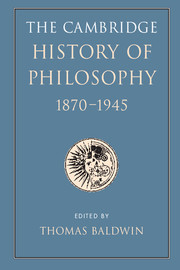Book contents
- Frontmatter
- Contents
- List of contributors
- Introduction
- I 1870–1914
- II 1914–1945
- 8 Logic and philosophy: the analytic programme
- 9 The diversity of philosophy
- 32 The continuing idealist tradition
- 33 Transformations in speculative philosophy
- 34 Realism, naturalism, and pragmatism
- 35 French Catholic philosophy
- 36 Spanish philosophy
- 37 The phenomenological movement
- 38 Heidegger
- 39 Latin american philosophy
- 40 Japanese philosophy
- 10 Knowledge, language, and the end of metaphysics
- 11 Philosophy and the exact sciences
- 12 Mind and its place in nature
- 13 Philosophy and social science
- 14 Ethics, religion, and the arts
- 15 Law and politics
- Biobibliographical appendix
- Bibliography
- INDEX
- References
36 - Spanish philosophy
from 9 - The diversity of philosophy
Published online by Cambridge University Press: 28 March 2008
- Frontmatter
- Contents
- List of contributors
- Introduction
- I 1870–1914
- II 1914–1945
- 8 Logic and philosophy: the analytic programme
- 9 The diversity of philosophy
- 32 The continuing idealist tradition
- 33 Transformations in speculative philosophy
- 34 Realism, naturalism, and pragmatism
- 35 French Catholic philosophy
- 36 Spanish philosophy
- 37 The phenomenological movement
- 38 Heidegger
- 39 Latin american philosophy
- 40 Japanese philosophy
- 10 Knowledge, language, and the end of metaphysics
- 11 Philosophy and the exact sciences
- 12 Mind and its place in nature
- 13 Philosophy and social science
- 14 Ethics, religion, and the arts
- 15 Law and politics
- Biobibliographical appendix
- Bibliography
- INDEX
- References
Summary
From 1870 to 1945 Spanish philosophy lived moments of splendour which, in contrast with the spiritual stagnation of the two preceding centuries, have earned it the epithet ‘The Silver Age’ of Spanish culture and thought. The great thinkers Unamuno and Ortega can be seen as its culmination. But it would be oversimplifying matters to reduce that splendour to only these two figures. In this chapter I shall consider five major moments: (1) Krausism; (2) Unamuno and the ‘Generation of'98’; (3) Ortega and the ‘Generation of'14’; (4) the Catalan philosopher Eugeni d'Ors; and (5) Zubiri and the ‘Generation of'27’.
KRAUSISM
For political and religious reasons Spanish culture has long kept itself apart from the rest of Europe. This explains why, especially since the Enlightenment, Spanish intellectual circles have raised again and again, with angry protest by traditionalists, the question of the europeización of Spain. Initially, people understood by this an opening up to French influence. But in the middle of the nineteenth century this term acquired a new meaning. The young Spaniard Julián Sanz del Río, who was interested in reforming the thought of his country, travelled to Germany in 1843, contacted there the philosophical circle of the Kantian/Schellingian Christian Krause, and returned home a converted apostle of Krausism, which spread like wildfire along university circles.
The Spanish Krausists embraced enthusiastically the Kantian moral idealism which was so characteristic of Krause himself. In time, nevertheless, this idealism entered into an alliance with the positivist materialism which was also in fashion: the common denominator of the idealist Krausists and materialist positivists was their passion for liberalism and progress.
- Type
- Chapter
- Information
- The Cambridge History of Philosophy 1870–1945 , pp. 469 - 476Publisher: Cambridge University PressPrint publication year: 2003



